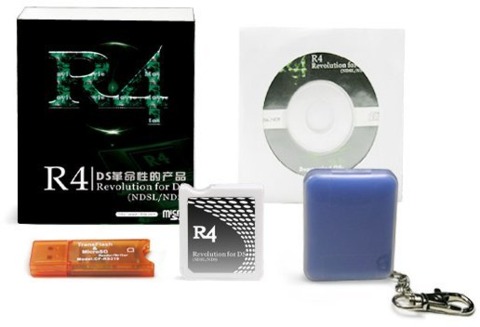Nintendo secures UK R4 ban
A High Court ruling clarifies existing law, specifying any device that circumvents DS antipiracy measures is illegal whether or not it has non-infringing uses.
Sales of R4 cards and similar devices have been officially banned in the UK. A ruling handed down in the High Court by Mr Justice Flood clarified existing intellectual property law regarding devices which circumvented effective technical measures put in place to protect copyright.
The case was brought by Nintendo against the firm Playables, from whom UK Trading Standards bodies had seized 165,000 such devices. R4 cards and similar devices plug into one of the DS unit's game card slots and allow DS owners to run software on their handhelds that have not been approved by Nintendo. They can be used for homebrew software and pirated copies of games, as well as unapproved third-party software such as e-book readers.

While Playables' sole shareholder and director Wai Dat Chan claimed the R4 and associate devices have significant uses other than piracy, the judge ruled that "the mere fact that the device can be used for a non-infringing purpose is not a defence," as long as it can be shown that copy-protection controls are being circumvented. Mr Chan also claimed he "did not know or have reason to believe that the accused devices would be used to make infringing copies," but this potential defence was dismissed out of hand by Mr Justice Flood.
The "game copiers," as the judge referred to the accused devices, "are templates for infringement," and the way in which they circumvent the DS's antipiracy measures is tantamount to copyright infringement in itself, according to Mr Justice Flood. All the accused devices copy the Nintendo Logo Data File into RAM on startup, as this file is required by the DS's own boot-up software to allow a device that has been plugged in to work. As Nintendo had not authorised this copying, this was deemed to be a further breach on the part of the accused devices.
While the judge dismissed two other arguments Nintendo made, relating to the shape of the cartridge itself being an antipiracy measure and the Nintendo Race Track Logo also being copied, he granted summary judgement against Mr Chan and Playables, as the defendants had no defence to take to trial. Neither Mr Chan nor any representative for Playables was present at any time during the hearing. As well as the R4 DS, the ruling covers the following: M3 DS, DS One Supercard, DSTT, DS Linker, Acekard, CycloDS Evolution, N5, and EZ.
This judgment stands in contrast to a decision in the US by the Library of Congress, which oversees the interpretation of copyright legislation, earlier in the week. The ruling, from Librarian of Congress James H. Billington, indicated that under the much-maligned Digital Millennium Copyright Act it was legal to circumvent hardware and software restrictions designed to make piracy more difficult if the circumvention was for non-infringing purposes, such as copying sections of a DVD work for criticism or running unapproved software on a mobile phone.
These exceptions were not, however, extended to gaming devices wholesale, but merely for "good faith testing for, investigating, or correcting security flaws or vulnerabilities," and then only if the information gained through this testing was used to promote safety of those using the devices and was not used to facilitate copyright infringement. This position reversed the long-standing interpretation that circumventing such restrictions, for any reason, was illegal.
Got a news tip or want to contact us directly? Email news@gamespot.com
Join the conversation